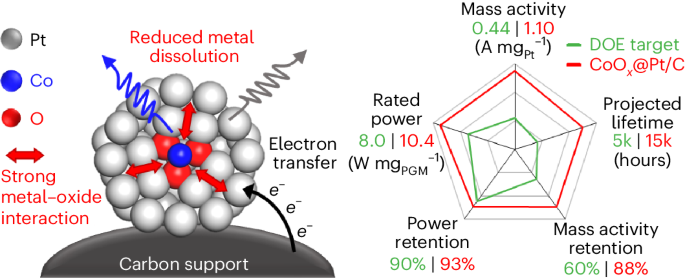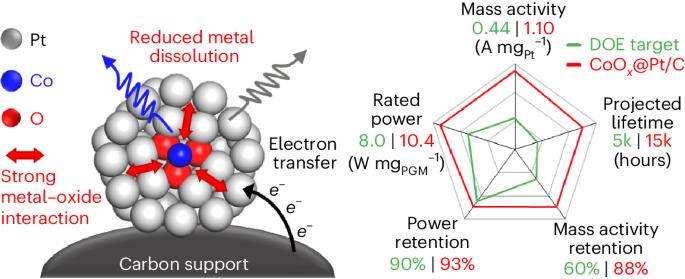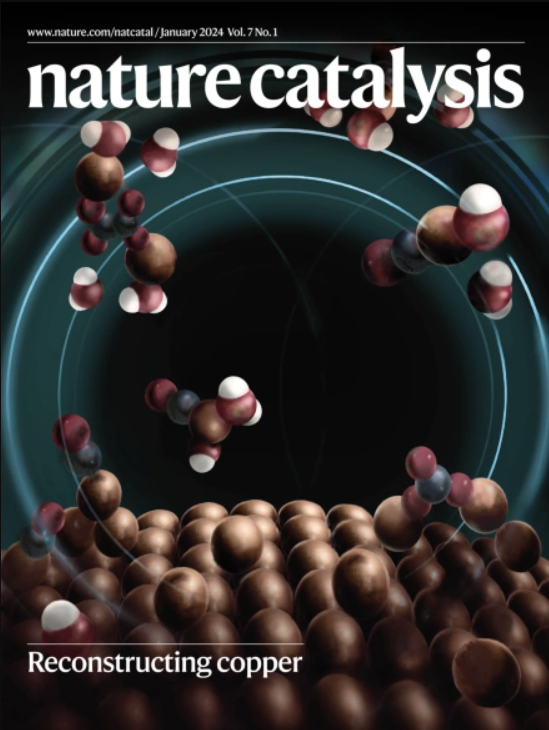嵌入式氧化物团簇稳定了 2 纳米以下的铂纳米颗粒,从而实现了高度耐用的燃料电池
IF 44.6
1区 化学
Q1 CHEMISTRY, PHYSICAL
引用次数: 0
摘要
铂(Pt)纳米催化剂对于促进质子交换膜燃料电池中的阴极氧还原反应至关重要,但其活性和耐用性之间存在权衡问题。在这里,我们介绍了一种精细纳米催化剂的设计,这种催化剂由铂纳米颗粒和稀疏嵌入的氧化钴团簇(CoOx@Pt)组成。这种设计利用了铂/氧化物的强相互作用,使催化剂在不牺牲活性的情况下具有较高的结构和化学耐久性。CoOx@Pt 纳米催化剂的初始质量活性高达 1.10 A mgPt-1,额定功率密度为 1.04 W cm-2,在膜电极组件中的铂利用率为 10.4 W mgPt-1。在加速应力测试后,它的耐用性显著提高,质量活性保持率达到 88.2%,0.8 A cm-2 时的电压损失为 13.3 mV,额定功率损失仅为 7.5%。这种耐用性可提供长达 15,000 小时的预期寿命,并可大大降低按寿命调整的成本。本文章由计算机程序翻译,如有差异,请以英文原文为准。


Embedded oxide clusters stabilize sub-2 nm Pt nanoparticles for highly durable fuel cells
Platinum (Pt) nanocatalysts are essential for facilitating the cathodic oxygen reduction reaction in proton exchange membrane fuel cells but suffer from a trade-off between activity and durability. Here we present the design of a fine nanocatalyst comprising Pt nanoparticles with sparsely embedded cobalt oxide clusters (CoOx@Pt). This design exploits the strong Pt/oxide interaction, which grants the catalyst its high structural and chemical durability without sacrificing activity. The CoOx@Pt nanocatalyst delivers a high initial mass activity of 1.10 A mgPt−1, a rated power density of 1.04 W cm−2 and a Pt utilization of 10.4 W mgPt−1 in a membrane electrode assembly. It exhibits a notably high durability that features a mass activity retention of 88.2%, a voltage loss of 13.3 mV at 0.8 A cm−2 and a small rated power loss of 7.5% after accelerated stress testing. This durability could offer a long projected lifetime of 15,000 hours and may greatly reduce the lifetime-adjusted cost. Pt-based catalysts are state-of-the-art cathodes in fuel cells, but they experience a trade-off between activity and durability. Now a Pt nanocatalyst with embedded cobalt oxide clusters is shown to promote stability during proton exchange membrane fuel cell operation without sacrificing activity, achieving 88.2% mass activity retention after 30,000 accelerated stress test cycles.
求助全文
通过发布文献求助,成功后即可免费获取论文全文。
去求助
来源期刊

Nature Catalysis
Chemical Engineering-Bioengineering
CiteScore
52.10
自引率
1.10%
发文量
140
期刊介绍:
Nature Catalysis serves as a platform for researchers across chemistry and related fields, focusing on homogeneous catalysis, heterogeneous catalysis, and biocatalysts, encompassing both fundamental and applied studies. With a particular emphasis on advancing sustainable industries and processes, the journal provides comprehensive coverage of catalysis research, appealing to scientists, engineers, and researchers in academia and industry.
Maintaining the high standards of the Nature brand, Nature Catalysis boasts a dedicated team of professional editors, rigorous peer-review processes, and swift publication times, ensuring editorial independence and quality. The journal publishes work spanning heterogeneous catalysis, homogeneous catalysis, and biocatalysis, covering areas such as catalytic synthesis, mechanisms, characterization, computational studies, nanoparticle catalysis, electrocatalysis, photocatalysis, environmental catalysis, asymmetric catalysis, and various forms of organocatalysis.
 求助内容:
求助内容: 应助结果提醒方式:
应助结果提醒方式:


